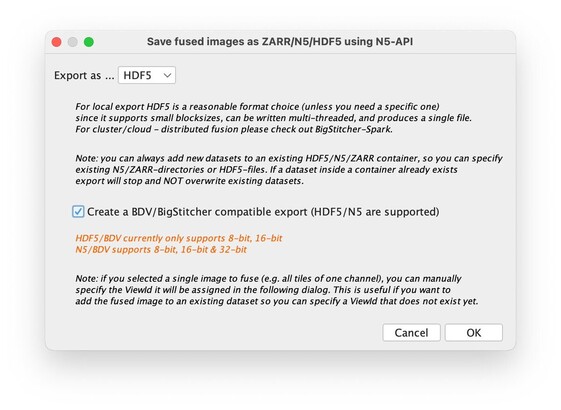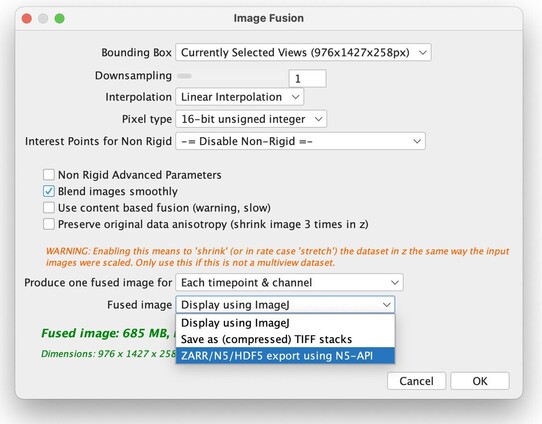Stephan Preibisch · @preibischs
319 followers · 52 posts · Server qoto.orgFollow-up update for #BigStitcher is out! Now supports:
1) export of BigDataViewer/BigStitcher compatible HDF5/N5 datasets
2) export of #OpenSeadragon datasets for 2D images and 2D slices of 3D images
QT: https://qoto.org/@preibischs/109611469671364414
Kay Schink · @kschink
141 followers · 208 posts · Server mstdn.scienceRT @preibischs
Follow-up update for #BigStitcher is out! Now supports
1) export of BigDataViewer/BigStitcher compatible HDF5/N5 datasets
2) export of @openseadragon datasets for 2D images and 2D slices of 3D images https://twitter.com/preibischs/status/1609368154702073856
Kay Schink · @kschink
141 followers · 208 posts · Server mstdn.scienceRT @preibischs
Exciting New Year's release of #BigStitcher! It now supports:
1) efficient blocked processing, meaning large, tiled acquisitions are fused blazingly fast (second/minutes instead of hours)!
2) Export of ZARR/N5/HDF5 thanks to the N5-API
Check it out, just update @FijiSc!
Edwin Hernandez-Garzon · @elfulbito
35 followers · 41 posts · Server qoto.orgRT @preibischs
Exciting New Year's release of #BigStitcher! It now supports:
1) efficient blocked processing, meaning large, tiled acquisitions are fused blazingly fast (second/minutes instead of hours)!
2) Export of ZARR/N5/HDF5 thanks to the N5-API
Check it out, just update @FijiSc!
Stephan Preibisch · @preibischs
310 followers · 50 posts · Server qoto.orgExciting New Year's release of #BigStitcher! It now supports:
1) efficient blocked processing, meaning large, tiled acquisitions are fused blazingly fast (second/minutes instead of hours)!
2) Export of ZARR/N5/HDF5 thanks to the N5-API
Check it out, just update Fiji!
Albert Cardona · @albertcardona
697 followers · 557 posts · Server qoto.orgNow onto #FijiSc: Fiji is a recursive acronym meaning "Fiji is just ImageJ" https://fji.sc (and the paper https://www.nature.com/articles/nmeth.2019 ) –and #ImageJ is a #java open source software for image processing https://imagej.nih.gov/ij/index.html written by Wayne Rasband from the #NIH Research Branch.
An analogy: think of ImageJ as the kernel and Fiji as the rest of the operating system.
#FijiSc brings to #ImageJ:
(1) a package manager to install and update plugins, and that crucially enables reproducible science by exporting the whole set of plugins and libraries as an executable;
(2) a Script Editor https://imagej.net/scripting/script-editor supporting many languages (#python, #groovy #ruby #scala #clojure and more), all with access to a huge collection of #JVM libraries;
(3) huge amount of libraries such as #ImgLib2, #JFreeChart for plotting, for GUIs, etc.
There are many, many plugins. A tiny sample:
Machine learning-based image segmentation:
- #LabKit https://imagej.net/plugins/labkit/
- #WEKA Trainable Segmentation https://imagej.net/plugins/tws/index
3D/4D/ND Visualization:
- 3D/4D Viewer #3DViewer https://imagej.net/plugins/3d-viewer/index with ray-tracing, orthoslices, volume rendering, and more
- #BigDataViewer #BDV https://imagej.net/plugins/bdv/index for interactively navigate N-dimensional image volumes larger than RAM
Image registration and serial section alignment:
- #BigStitcher for registering 3D/4D tiled datasets, with multiview deconvolution and more https://imagej.net/plugins/bigstitcher/index
- #TrakEM2 for montaging in 2D and alinging in 3D collections of serial sections, typically from #vEM (volume electron microscopy) https://syn.mrc-lmb.cam.ac.uk/acardona/INI-2008-2011/trakem2.html
- #mpicbg libraries for extracting #SIFT and #MOPS features, then finding feature correspondences and estimating rigid and elastic transformation models https://www.nature.com/articles/nmeth.2072
Summarizing #FijiSc is impossible. See the online forum where questions find answers by the hand of the broader community of users and developers https://forum.image.sc/
#java #nih #python #groovy #ruby #BigDataViewer #BigStitcher #TrakEM2 #sift #FijiSc #imagej #scala #clojure #jvm #ImgLib2 #JFreeChart #LabKit #weka #3DViewer #bdv #vem #mpicbg #mops





